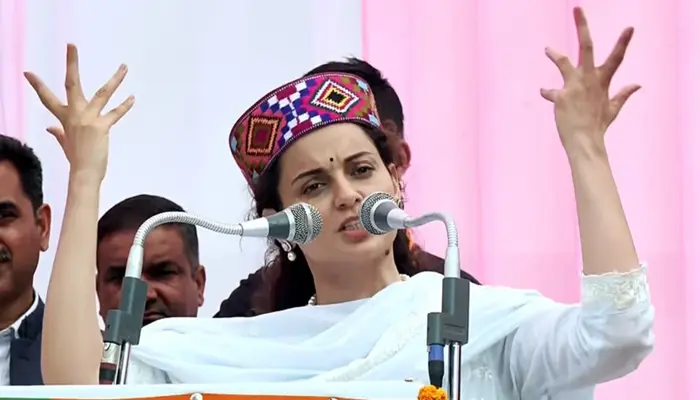NEW DELHI: Bollywood actress and BJP Member of Parliament Kangana Ranaut triggered political uproar after comparing Prime Minister Narendra Modi to former U.S. President Donald Trump in a now-deleted tweet.
In her post, Kangana claimed Trump was “jealous” of Modi’s global popularity. She called Modi the “father of all alpha males.” The tweet went viral quickly, drawing criticism from several BJP leaders.
Party members urged BJP President JP Nadda to intervene. Following his directive, Kangana deleted the tweet and issued a public apology.
She admitted that her views were personal and not endorsed by the party. “Respected national party president Shri JP Nadda ji called me and asked to remove the tweet I had posted, highlighting Donald Trump asking Apple CEO Tim Cook to stop manufacturing in India. I apologise for posting my very personal opinions,” she wrote.
Kangana initially defended her statement but later conceded after pressure from senior party officials.
This controversy sheds light on the fragile balance India tries to maintain in its foreign relations—especially with global powers like the United States.
The timing of the post was sensitive. It came as India continues strengthening trade ties with the U.S., particularly in the tech sector.
Earlier this year, Apple shifted a major portion of its iPhone production to India. The move was prompted by Trump-era tariffs that imposed a 125% tax on imports from China. Apple responded by expanding its Indian operations.
In recent months, India has become a key hub for iPhone production. Around 600 tons of iPhones—about 1.5 million devices—were exported to the U.S. through chartered cargo flights.
Trump had publicly criticized Apple’s migration to India. He demanded that the tech company halt manufacturing outside the U.S., particularly in India.
Kangana’s tweet referred to this statement. However, BJP leaders feared her comment could complicate sensitive diplomatic relations between India and the United States.
The party, known for tight message control, acted swiftly to prevent further fallout.
Observers note that such controversies underline how even personal posts by party members can affect India’s international image. Political leaders and influencers are now under tighter scrutiny regarding foreign affairs.
This incident also highlights the growing influence of social media on diplomatic narratives and internal party discipline.
While Kangana continues to be an outspoken supporter of Prime Minister Modi, this episode shows that even loyal voices must align with the party’s diplomatic stance.
The BJP has not commented further on the issue. Kangana, too, has remained silent after her apology.
As India expands its global partnerships, political sensitivity around foreign relations is likely to grow even stronger.
